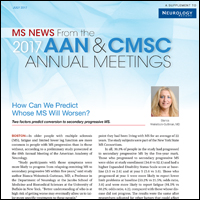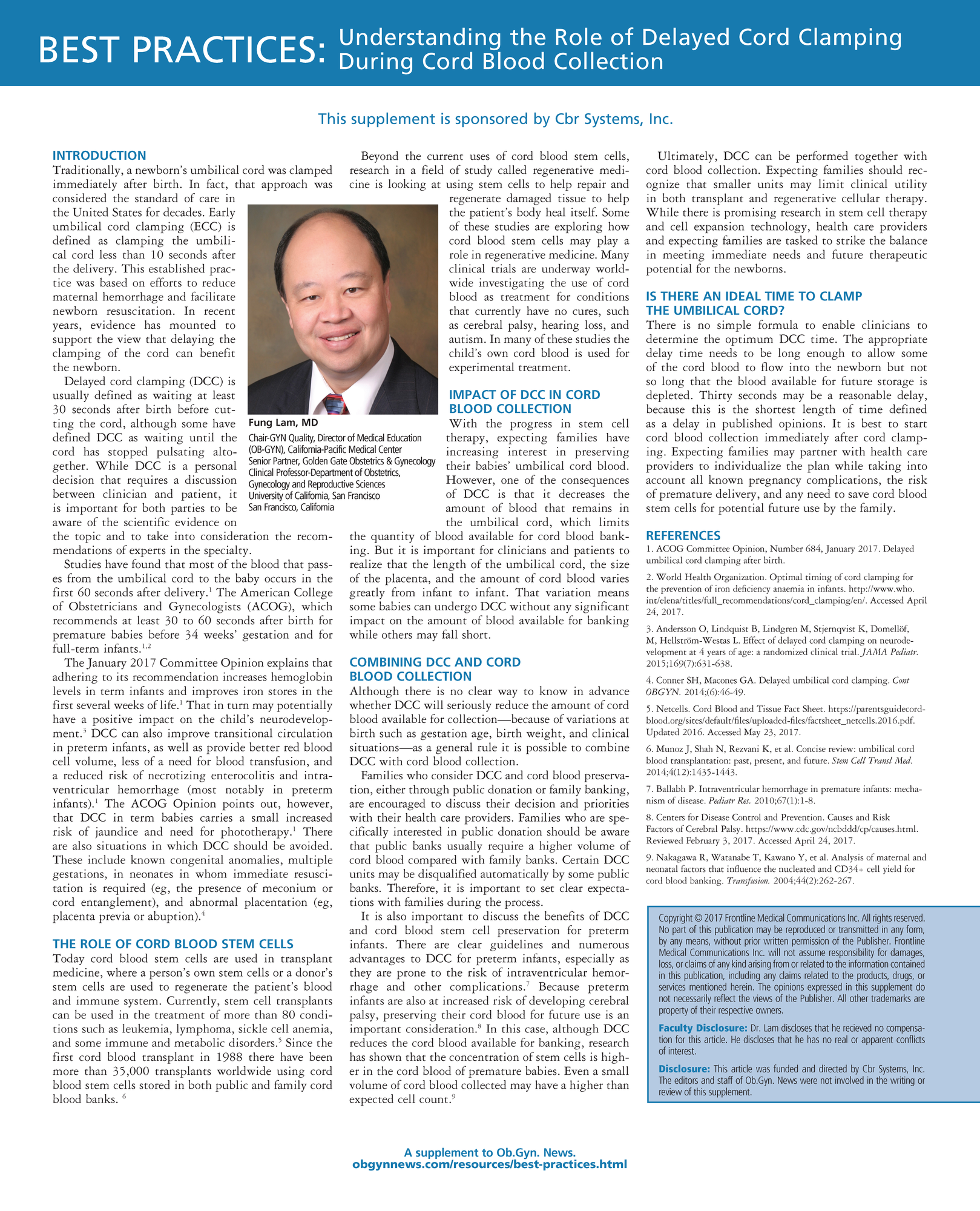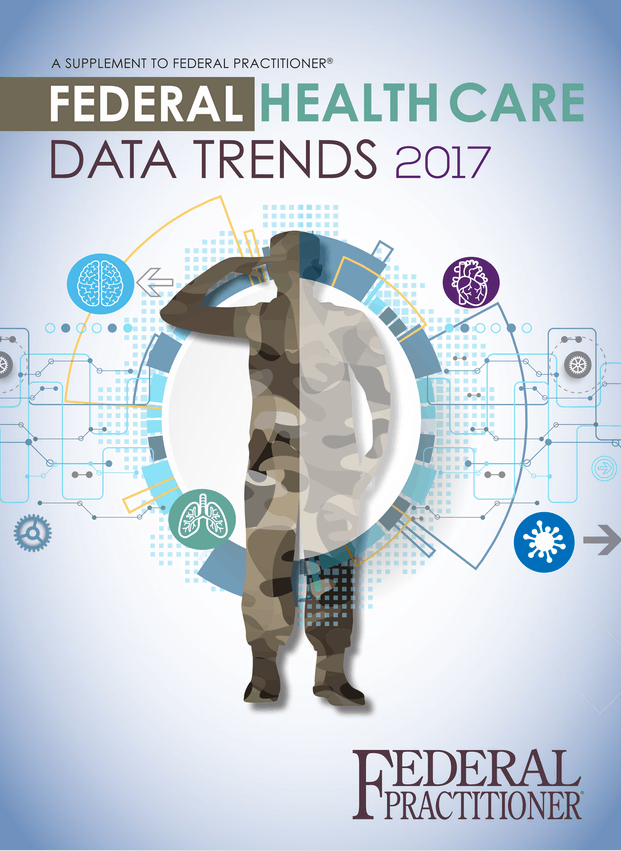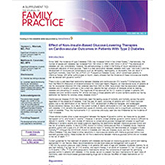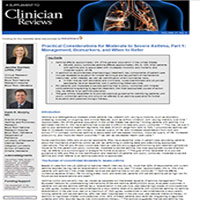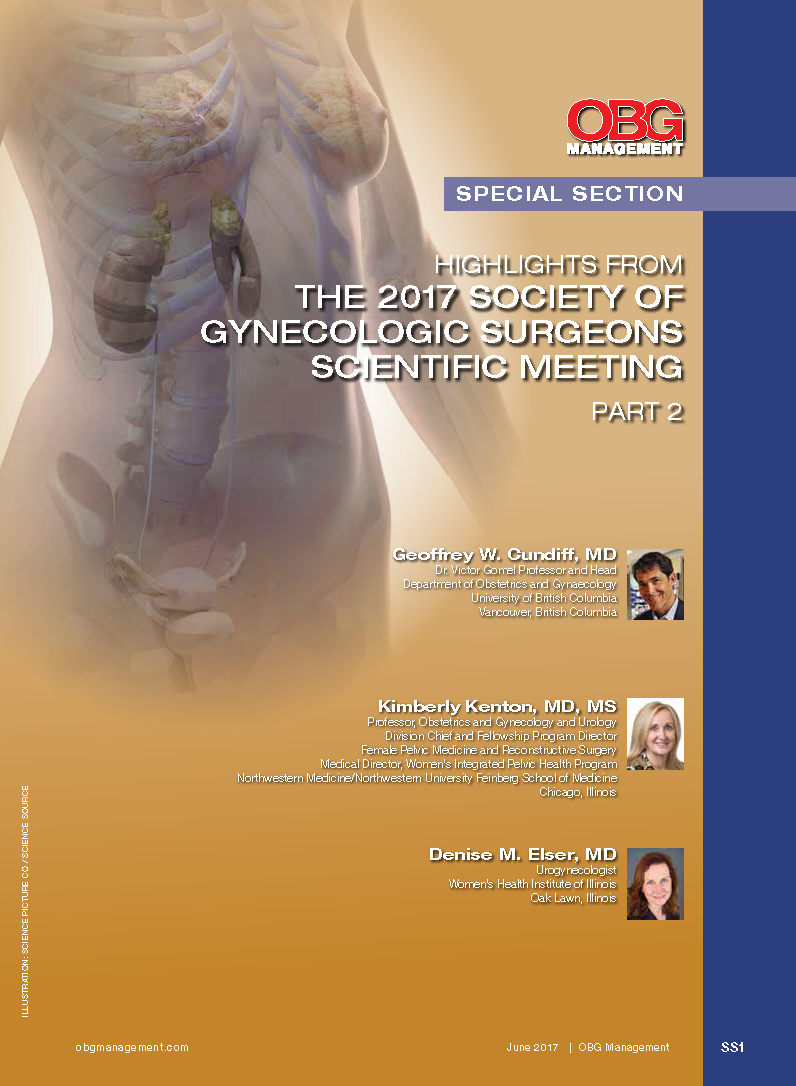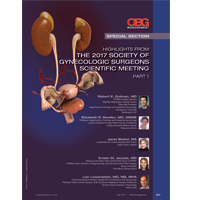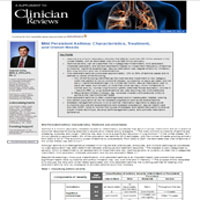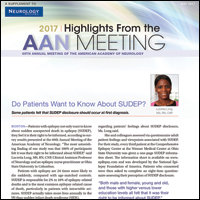User login
MS News From the AAN & CMSC Annual Meetings
Best Practices: Understanding the Role of Delayed Cord Clamping During Cord Blood Collection
Click Here to Read Supplement.
Topics Include:
- The Role of Cord Blood Stem Cells
- Impact of DCC in Cord Blood Collection
- Combining DCC and Cord Blood Collection
- When to Clamp the Umbilical Cord
Faculty/Faculty Disclosure:
Fung Lam, MD
Chair-GYN Quality, Director of Medical Education (OB-GYN), California-Pacific Medical Center
Senior Partner, Golden Gate Obstetrics & Gynecology
Clinical Professor-Department of Obstetrics, Gynecology and Reproductive Sciences
University of California, San Francisco
San Francisco, California
Click Here to Read Supplement.
Topics Include:
- The Role of Cord Blood Stem Cells
- Impact of DCC in Cord Blood Collection
- Combining DCC and Cord Blood Collection
- When to Clamp the Umbilical Cord
Faculty/Faculty Disclosure:
Fung Lam, MD
Chair-GYN Quality, Director of Medical Education (OB-GYN), California-Pacific Medical Center
Senior Partner, Golden Gate Obstetrics & Gynecology
Clinical Professor-Department of Obstetrics, Gynecology and Reproductive Sciences
University of California, San Francisco
San Francisco, California
Click Here to Read Supplement.
Topics Include:
- The Role of Cord Blood Stem Cells
- Impact of DCC in Cord Blood Collection
- Combining DCC and Cord Blood Collection
- When to Clamp the Umbilical Cord
Faculty/Faculty Disclosure:
Fung Lam, MD
Chair-GYN Quality, Director of Medical Education (OB-GYN), California-Pacific Medical Center
Senior Partner, Golden Gate Obstetrics & Gynecology
Clinical Professor-Department of Obstetrics, Gynecology and Reproductive Sciences
University of California, San Francisco
San Francisco, California
Federal Health Care Data Trends 2017
Effect of Non–Insulin-Based Glucose-Lowering Therapies on Cardiovascular Outcomes in Patients With Type 2 Diabetes
While type 2 diabetes (T2D) is commonly seen in primary care, it is difficult to control successfully over time. This series offers brief eNewsletters written by clinical experts that are designed to assist in the clinical management of patients with T2D.
This fourth eNewsletter in the series, entitled Effect of Non–Insulin-Based Glucose-Lowering Therapies on Cardiovascular Outcomes in Patients With Type 2 Diabetes, was written by Szymon L. Wiernek, MD, PhD, and Matthew A. Cavender, MD, MPH. It presents an overview of commonly used non–insulin-based glucose-lowering drugs in the context of cardiovascular disease risk. The basic mechanisms of action for each pharmacotherapeutic class and the effects of these medications on cardiovascular events are discussed so that physicians can make informed treatment decisions
Click here to read the supplement
Department of Medicine University of North Carolina-Chapel Hill
Chapel Hill, NC
Department of Medicine University of North Carolina-Chapel Hill
Chapel Hill, NC
While type 2 diabetes (T2D) is commonly seen in primary care, it is difficult to control successfully over time. This series offers brief eNewsletters written by clinical experts that are designed to assist in the clinical management of patients with T2D.
This fourth eNewsletter in the series, entitled Effect of Non–Insulin-Based Glucose-Lowering Therapies on Cardiovascular Outcomes in Patients With Type 2 Diabetes, was written by Szymon L. Wiernek, MD, PhD, and Matthew A. Cavender, MD, MPH. It presents an overview of commonly used non–insulin-based glucose-lowering drugs in the context of cardiovascular disease risk. The basic mechanisms of action for each pharmacotherapeutic class and the effects of these medications on cardiovascular events are discussed so that physicians can make informed treatment decisions
Click here to read the supplement
Department of Medicine University of North Carolina-Chapel Hill
Chapel Hill, NC
Department of Medicine University of North Carolina-Chapel Hill
Chapel Hill, NC
While type 2 diabetes (T2D) is commonly seen in primary care, it is difficult to control successfully over time. This series offers brief eNewsletters written by clinical experts that are designed to assist in the clinical management of patients with T2D.
This fourth eNewsletter in the series, entitled Effect of Non–Insulin-Based Glucose-Lowering Therapies on Cardiovascular Outcomes in Patients With Type 2 Diabetes, was written by Szymon L. Wiernek, MD, PhD, and Matthew A. Cavender, MD, MPH. It presents an overview of commonly used non–insulin-based glucose-lowering drugs in the context of cardiovascular disease risk. The basic mechanisms of action for each pharmacotherapeutic class and the effects of these medications on cardiovascular events are discussed so that physicians can make informed treatment decisions
Click here to read the supplement
Department of Medicine University of North Carolina-Chapel Hill
Chapel Hill, NC
Department of Medicine University of North Carolina-Chapel Hill
Chapel Hill, NC
Practical Considerations for Moderate to Severe Asthma, Part 1: Management, Biomarkers, and When to Refer
This newsletter, Practical Considerations for Moderate to Severe Asthma, Part 1: Management, Biomarkers, and When to Refer, provides detailed guidance for nurse practitioners and physician assistants on how to identify, evaluate, and treat patients with poorly controlled, moderate to severe asthma.
Click here to read the supplement
Clinical Research Coordinator
Boys Town National Research Hospital
Boys Town, Nebraska
Kevin R. Murphy, MD
Director of Allergy, Asthma, and Pulmonary Research
Boys Town National Research Hospital
Boys Town, Nebraska
Department of Pediatrics
University of Nebraska Medical Center
Creighton University School of Medicine
Omaha, Nebraska
This newsletter, Practical Considerations for Moderate to Severe Asthma, Part 1: Management, Biomarkers, and When to Refer, provides detailed guidance for nurse practitioners and physician assistants on how to identify, evaluate, and treat patients with poorly controlled, moderate to severe asthma.
Click here to read the supplement
Clinical Research Coordinator
Boys Town National Research Hospital
Boys Town, Nebraska
Kevin R. Murphy, MD
Director of Allergy, Asthma, and Pulmonary Research
Boys Town National Research Hospital
Boys Town, Nebraska
Department of Pediatrics
University of Nebraska Medical Center
Creighton University School of Medicine
Omaha, Nebraska
This newsletter, Practical Considerations for Moderate to Severe Asthma, Part 1: Management, Biomarkers, and When to Refer, provides detailed guidance for nurse practitioners and physician assistants on how to identify, evaluate, and treat patients with poorly controlled, moderate to severe asthma.
Click here to read the supplement
Clinical Research Coordinator
Boys Town National Research Hospital
Boys Town, Nebraska
Kevin R. Murphy, MD
Director of Allergy, Asthma, and Pulmonary Research
Boys Town National Research Hospital
Boys Town, Nebraska
Department of Pediatrics
University of Nebraska Medical Center
Creighton University School of Medicine
Omaha, Nebraska
Highlights from The 2017 Society of Gynecologic Surgeons Scientific Meeting
PART 1

Robert E. Gutman, MD
FPMRS Program Director
MedStar Washington Hospital Center
Associate Professor
Departments of Urology and Obstetrics/Gynecology
Georgetown University
Washington, DC

Elizabeth R. Mueller, MD, MSME
Professor, Departments of Urology and Obstetrics/Gynecology
Loyola University Chicago Stritch School of Medicine
Loyola University Medical Center
Maywood, Illinois

Janet Bickel, MA
Leadership and Career Development Coach
Falls Church, Virginia

Kristin M. Jacobs, MD
Steering Committee Chair, AUGS-SGS Group of FPRN®
FPMRS Fellow, Division of Urogynecology and Reconstructive Pelvic Surgery
Brown University
Providence, Rhode Island

Lior Lowenstein, MD, MS, MHA
Clinical Associate Professor, Department of Obstetrics and Gynecology
Rambam Health Center Campus, Ruth and Bruce Rappaport Faculty of Medicine
Technion Israel Institute of Technology
Haifa, Israel
Drs. Gutman, Jacobs, and Lowenstein and Ms. Bickel report no financial relationships relevant to their articles. Dr. Mueller reports that she is an investigator for and is on the advisory board of Astellas Medical and Scientific Affairs.
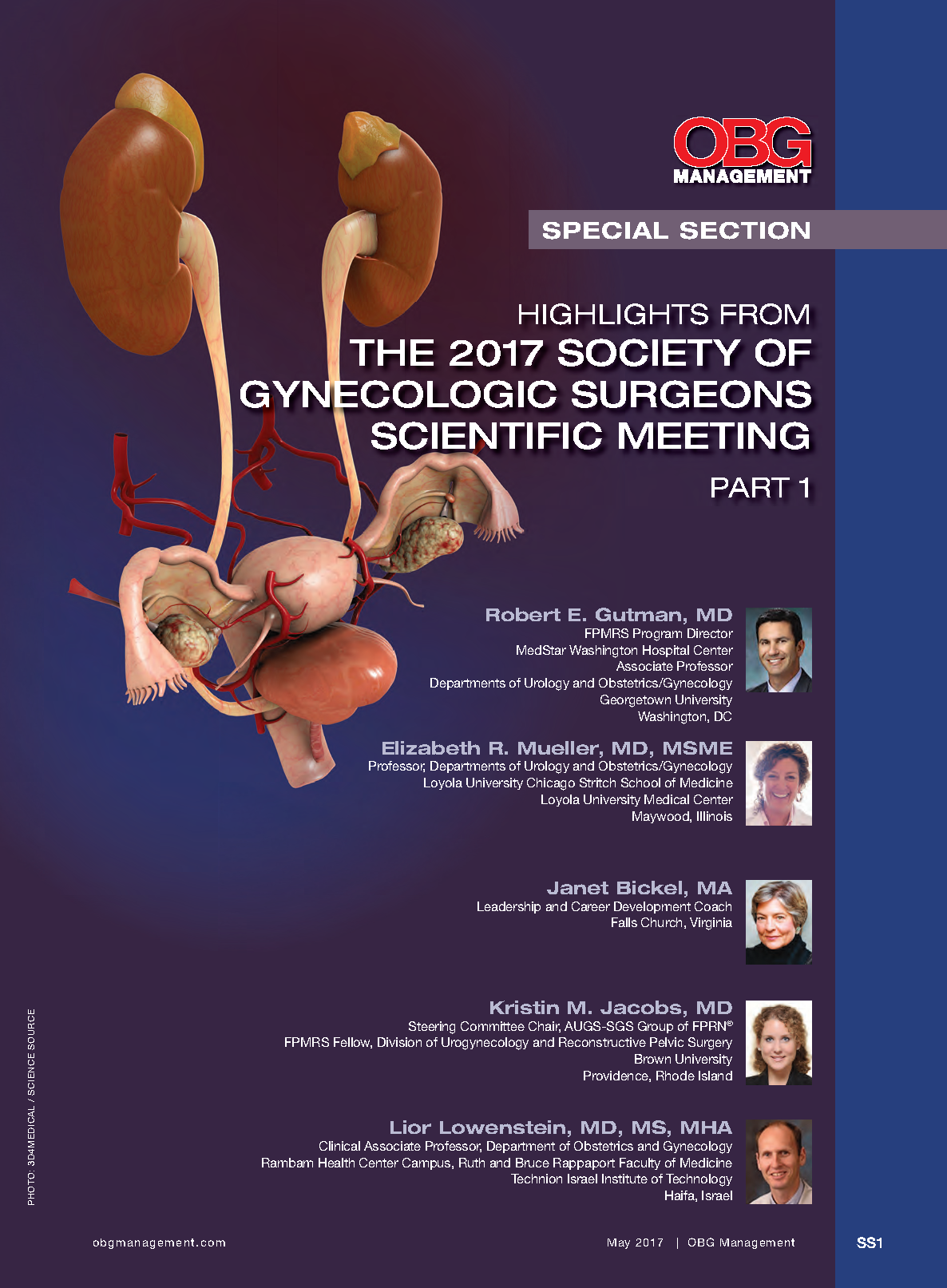
PART 2

Geoffrey W. Cundiff, MD
Dr. Victor Gomel Professor and Head
Department of Obstetrics and Gynaecology
University of Bristish Columbia
Vancouver, British Columbia

Kimberly Kenton, MD, MS
Professor, Obstetrics and Gynaecology and Urology
Divison Chief and Fellowship Program Director
Female Pelvis Medicine and Reconstructive Surgery
Medicial Director, Women's Integrated Pelvic Health Program
Northwestern Medicine/Northwestern University Feinberg School of Medicince
Chicago, Illinois

Denise M. Elser, MD
Urogynecologist
Women's Health Institute of Illinois
Oak Lawn, Illinois
Drs. Cundiff and Elser report no financial relationships relevant to their articles. Dr. Kenton reports that she receives grant or research support from Boston Scientific and the National Institutes of Health, and that she serves as an expert witness for the Butler Snow Law Firm/Ethicon.
PART 1

Robert E. Gutman, MD
FPMRS Program Director
MedStar Washington Hospital Center
Associate Professor
Departments of Urology and Obstetrics/Gynecology
Georgetown University
Washington, DC

Elizabeth R. Mueller, MD, MSME
Professor, Departments of Urology and Obstetrics/Gynecology
Loyola University Chicago Stritch School of Medicine
Loyola University Medical Center
Maywood, Illinois

Janet Bickel, MA
Leadership and Career Development Coach
Falls Church, Virginia

Kristin M. Jacobs, MD
Steering Committee Chair, AUGS-SGS Group of FPRN®
FPMRS Fellow, Division of Urogynecology and Reconstructive Pelvic Surgery
Brown University
Providence, Rhode Island

Lior Lowenstein, MD, MS, MHA
Clinical Associate Professor, Department of Obstetrics and Gynecology
Rambam Health Center Campus, Ruth and Bruce Rappaport Faculty of Medicine
Technion Israel Institute of Technology
Haifa, Israel
Drs. Gutman, Jacobs, and Lowenstein and Ms. Bickel report no financial relationships relevant to their articles. Dr. Mueller reports that she is an investigator for and is on the advisory board of Astellas Medical and Scientific Affairs.

PART 2

Geoffrey W. Cundiff, MD
Dr. Victor Gomel Professor and Head
Department of Obstetrics and Gynaecology
University of Bristish Columbia
Vancouver, British Columbia

Kimberly Kenton, MD, MS
Professor, Obstetrics and Gynaecology and Urology
Divison Chief and Fellowship Program Director
Female Pelvis Medicine and Reconstructive Surgery
Medicial Director, Women's Integrated Pelvic Health Program
Northwestern Medicine/Northwestern University Feinberg School of Medicince
Chicago, Illinois

Denise M. Elser, MD
Urogynecologist
Women's Health Institute of Illinois
Oak Lawn, Illinois
Drs. Cundiff and Elser report no financial relationships relevant to their articles. Dr. Kenton reports that she receives grant or research support from Boston Scientific and the National Institutes of Health, and that she serves as an expert witness for the Butler Snow Law Firm/Ethicon.
PART 1

Robert E. Gutman, MD
FPMRS Program Director
MedStar Washington Hospital Center
Associate Professor
Departments of Urology and Obstetrics/Gynecology
Georgetown University
Washington, DC

Elizabeth R. Mueller, MD, MSME
Professor, Departments of Urology and Obstetrics/Gynecology
Loyola University Chicago Stritch School of Medicine
Loyola University Medical Center
Maywood, Illinois

Janet Bickel, MA
Leadership and Career Development Coach
Falls Church, Virginia

Kristin M. Jacobs, MD
Steering Committee Chair, AUGS-SGS Group of FPRN®
FPMRS Fellow, Division of Urogynecology and Reconstructive Pelvic Surgery
Brown University
Providence, Rhode Island

Lior Lowenstein, MD, MS, MHA
Clinical Associate Professor, Department of Obstetrics and Gynecology
Rambam Health Center Campus, Ruth and Bruce Rappaport Faculty of Medicine
Technion Israel Institute of Technology
Haifa, Israel
Drs. Gutman, Jacobs, and Lowenstein and Ms. Bickel report no financial relationships relevant to their articles. Dr. Mueller reports that she is an investigator for and is on the advisory board of Astellas Medical and Scientific Affairs.

PART 2

Geoffrey W. Cundiff, MD
Dr. Victor Gomel Professor and Head
Department of Obstetrics and Gynaecology
University of Bristish Columbia
Vancouver, British Columbia

Kimberly Kenton, MD, MS
Professor, Obstetrics and Gynaecology and Urology
Divison Chief and Fellowship Program Director
Female Pelvis Medicine and Reconstructive Surgery
Medicial Director, Women's Integrated Pelvic Health Program
Northwestern Medicine/Northwestern University Feinberg School of Medicince
Chicago, Illinois

Denise M. Elser, MD
Urogynecologist
Women's Health Institute of Illinois
Oak Lawn, Illinois
Drs. Cundiff and Elser report no financial relationships relevant to their articles. Dr. Kenton reports that she receives grant or research support from Boston Scientific and the National Institutes of Health, and that she serves as an expert witness for the Butler Snow Law Firm/Ethicon.

Mild Persistent Asthma: Characteristics, Treatment, and Unmet Needs
This newsletter, Mild Persistent Asthma: Characteristics, Treatment, and Unmet Needs, discusses the characteristics and burden of mild persistent asthma and provides practical information on its diagnosis and appropriate management.
Click here to read the supplement
PA-C
Former American Academy of Physician Assistants (AAPA) Liaison to the American Academy of Allergy Asthma and Immunology (AAAAI) and former Liaison from AAAAI to the AAPA.
This newsletter, Mild Persistent Asthma: Characteristics, Treatment, and Unmet Needs, discusses the characteristics and burden of mild persistent asthma and provides practical information on its diagnosis and appropriate management.
Click here to read the supplement
PA-C
Former American Academy of Physician Assistants (AAPA) Liaison to the American Academy of Allergy Asthma and Immunology (AAAAI) and former Liaison from AAAAI to the AAPA.
This newsletter, Mild Persistent Asthma: Characteristics, Treatment, and Unmet Needs, discusses the characteristics and burden of mild persistent asthma and provides practical information on its diagnosis and appropriate management.
Click here to read the supplement
PA-C
Former American Academy of Physician Assistants (AAPA) Liaison to the American Academy of Allergy Asthma and Immunology (AAAAI) and former Liaison from AAAAI to the AAPA.
Highlights From the 69th Annual Meeting of the American Academy of Neurology
Selected highlights from the 69th Annual Meeting of the American Academy of Neurology
Selected highlights from the 69th Annual Meeting of the American Academy of Neurology
Selected highlights from the 69th Annual Meeting of the American Academy of Neurology
